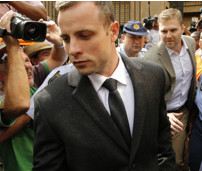
The Oscar Pistorius trial has presented a conundrum for the country's best journalists, as they've been sucked into the hype, writes Verashni Pillay.
The media's contention that it is covering the Oscar Pistorius trial "for the public good" is starting to look a little threadbare. Pistorius is charged with murdering his girlfriend Reeva Steenkamp in his Silver Woods, Pretoria, home last year.
On Monday, a lawyer on behalf of broadcast media argued that the forensic and post-mortem testimony at the trial ought to be made live. Judge Thokozile Masipa disagreed and perhaps went too far in banning tweeting and liveblogging too.
But something ugly was revealed in that moment, when the trial had to be stopped so the media's lawyers could arrive to convince the judge that not a morsel of the proceedings be wasted.
It is difficult to argue that audio of the detailed and graphic forensic testimony was in the public interest. Easier to believe is that it makes for great prime-time viewing.
And while Masipa is being criticised by legal experts for her strange decision to ban all coverage of that testimony except for delayed "summaries", one word springs to mind: gatvol. Maybe the good judge is just as tired as many South Africans seem to be with the feeding frenzy this trial has sparked among our brightest and best journalists, crammed into a single court and picking over details 10 of their peers have already relayed to us.
It's why I count not covering this trial as one of my blessings, along with my good health, fine country, and the fact that I wasn't born 150 years ago with my only career prospects a stint in the sugar cane fields.
The trial, of course, is a boon for local journalism. Ask any editor about the spike in traffic/Twitter followers/viewership on that fateful Valentine's Day last year when the famed athlete shot and killed Steenkamp, claiming he mistook her for an intruder.
And those spikes have gone up again a year later as the "the biggest trial in a century", as some news outlets would have it, began. The journalists who became instant Twitterati in February 2013 again experienced a jump in followers from March 3 as the trial began.
As the media machine goes into overdrive it's hard not to get sucked into the Pistorius coverage. No wonder more and more South Africans are wary – and weary – of all things Pistorius.
It's all the excess, you see. So many resources have been thrown at this trial, and not just by the wealthy Pistorius on his top-notch legal defence. The media and the justice system have also been seduced by the glamour of wealth and fame to give their all to this trial. The speed with which Pistorius's trial was brought to court, the level of expertise involved, and the glut of media coverage are particularly grating, given a third of our prison population don't even know if they are guilty or not but are stuck behind bars anyway awaiting trial, unable to afford bail to get out.
"Double standards and precedent setting. That's the issue. What makes this evidence/victim different from all other cases?" tweeted Hussain Dewan.
Many South Africans have also compared the niceties of this trial to the way the horrific rape and murder of Western Cape teen Anene Booysen was handled.
"Could it be any gorier than the awful details of Anene Booysen's violent death, which were available to us and widely reported?" tweeted Anita Powell after the judge's move to prevent graphic details of the forensic testimony from being published.
But then there is the conundrum journalists find themselves in, if covering this trial.
We've seen it already: the country's top reporters are in the hot seat, tweeting every moment, word and gesture, no matter how inane. I have a lot of respect for all these individuals but they have an unenviable task. They have to essentially feed the increasing hype surrounding this trial and it's difficult not to get sucked into trivialities to keep the machine happy.
We've seen reporters tweet asides about Pistorius winking their way, or pictures of each other outside the court room. And they and their bosses have to justify devoting this coverage at the expense of other stories. There are only so many court reporters to go around, after all.
Many reporters have done good work where possible. Daily Maverick's Rebecca Davis has used the opportunity to talk about gender issues. The Mail & Guardian's Phillip de Wet refused to join the journalists detailing how Pistorius was doubled over retching, in lieu of the forensic evidence they were forbidden from tweeting.
"Journalists, banned from tweeting about #OscarTrial have resorted to tweeting about not being able to tweet about #OscarTrial," quipped comedian Deep Fried Man.
It's a fine line, and one I wouldn't like to try to walk for fear of being tempted as many are into tweeting trivialities to keep the machine fed. But it's the nature of the beast of celebrity trials, and we've all obliged it in one way or another, despite how clearly disproportionate our attention is to this particular trial. All we can hope for is a quick end, and a sustained interest in the broader issues this trial has put under the spotlight – including speedy access to justice for all South Africans.
By: Verashni Pillay
Verashni Pillay is a Rhodes University graduate
Article Source: Mail & Guardian
